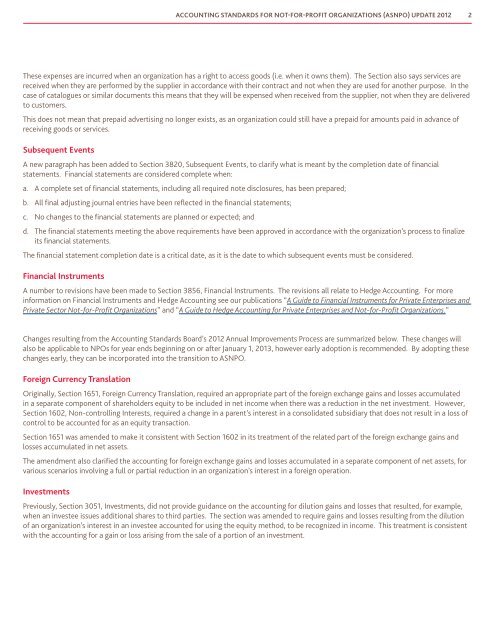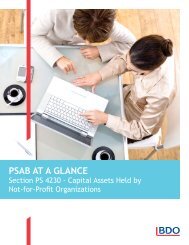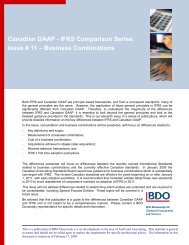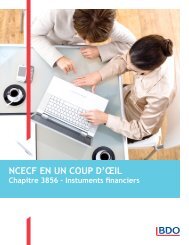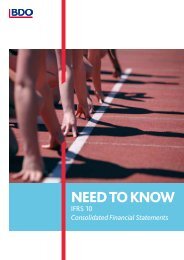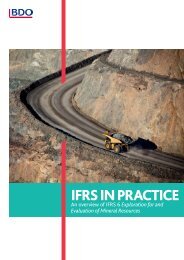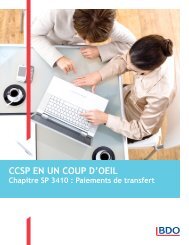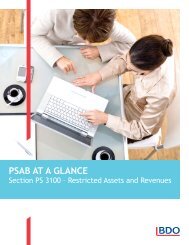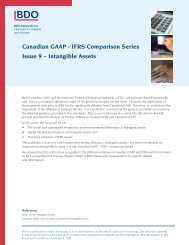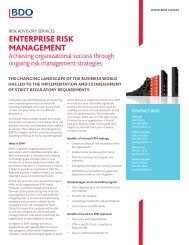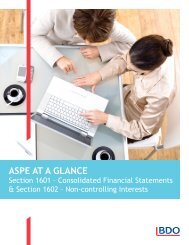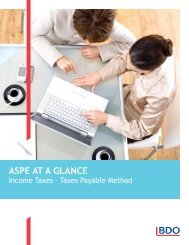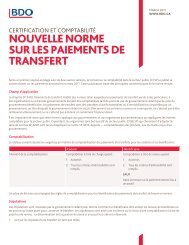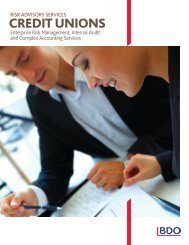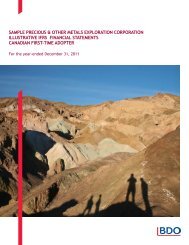Accounting Standards for Not-for-Profit Organizations - BDO Canada
Accounting Standards for Not-for-Profit Organizations - BDO Canada
Accounting Standards for Not-for-Profit Organizations - BDO Canada
Create successful ePaper yourself
Turn your PDF publications into a flip-book with our unique Google optimized e-Paper software.
ACCOUNTING STANDARDS FOR NOT-FOR-PROFIT ORGANIZATIONS (ASNPO) UPDATE 20122These expenses are incurred when an organization has a right to access goods (i.e. when it owns them). The Section also says services arereceived when they are per<strong>for</strong>med by the supplier in accordance with their contract and not when they are used <strong>for</strong> another purpose. In thecase of catalogues or similar documents this means that they will be expensed when received from the supplier, not when they are deliveredto customers.This does not mean that prepaid advertising no longer exists, as an organization could still have a prepaid <strong>for</strong> amounts paid in advance ofreceiving goods or services.Subsequent EventsA new paragraph has been added to Section 3820, Subsequent Events, to clarify what is meant by the completion date of financialstatements. Financial statements are considered complete when:a. A complete set of financial statements, including all required note disclosures, has been prepared;b. All final adjusting journal entries have been reflected in the financial statements;c. No changes to the financial statements are planned or expected; andd. The financial statements meeting the above requirements have been approved in accordance with the organization’s process to finalizeits financial statements.The financial statement completion date is a critical date, as it is the date to which subsequent events must be considered.Financial InstrumentsA number to revisions have been made to Section 3856, Financial Instruments. The revisions all relate to Hedge <strong>Accounting</strong>. For morein<strong>for</strong>mation on Financial Instruments and Hedge <strong>Accounting</strong> see our publications “A Guide to Financial Instruments <strong>for</strong> Private Enterprises andPrivate Sector <strong>Not</strong>-<strong>for</strong>-<strong>Profit</strong> <strong>Organizations</strong>” and “A Guide to Hedge <strong>Accounting</strong> <strong>for</strong> Private Enterprises and <strong>Not</strong>-<strong>for</strong>-<strong>Profit</strong> <strong>Organizations</strong>.”Changes resulting from the <strong>Accounting</strong> <strong>Standards</strong> Board’s 2012 Annual Improvements Process are summarized below. These changes willalso be applicable to NPOs <strong>for</strong> year ends beginning on or after January 1, 2013, however early adoption is recommended. By adopting thesechanges early, they can be incorporated into the transition to ASNPO.Foreign Currency TranslationOriginally, Section 1651, Foreign Currency Translation, required an appropriate part of the <strong>for</strong>eign exchange gains and losses accumulatedin a separate component of shareholders equity to be included in net income when there was a reduction in the net investment. However,Section 1602, Non-controlling Interests, required a change in a parent’s interest in a consolidated subsidiary that does not result in a loss ofcontrol to be accounted <strong>for</strong> as an equity transaction.Section 1651 was amended to make it consistent with Section 1602 in its treatment of the related part of the <strong>for</strong>eign exchange gains andlosses accumulated in net assets.The amendment also clarified the accounting <strong>for</strong> <strong>for</strong>eign exchange gains and losses accumulated in a separate component of net assets, <strong>for</strong>various scenarios involving a full or partial reduction in an organization’s interest in a <strong>for</strong>eign operation.InvestmentsPreviously, Section 3051, Investments, did not provide guidance on the accounting <strong>for</strong> dilution gains and losses that resulted, <strong>for</strong> example,when an investee issues additional shares to third parties. The section was amended to require gains and losses resulting from the dilutionof an organization’s interest in an investee accounted <strong>for</strong> using the equity method, to be recognized in income. This treatment is consistentwith the accounting <strong>for</strong> a gain or loss arising from the sale of a portion of an investment.


